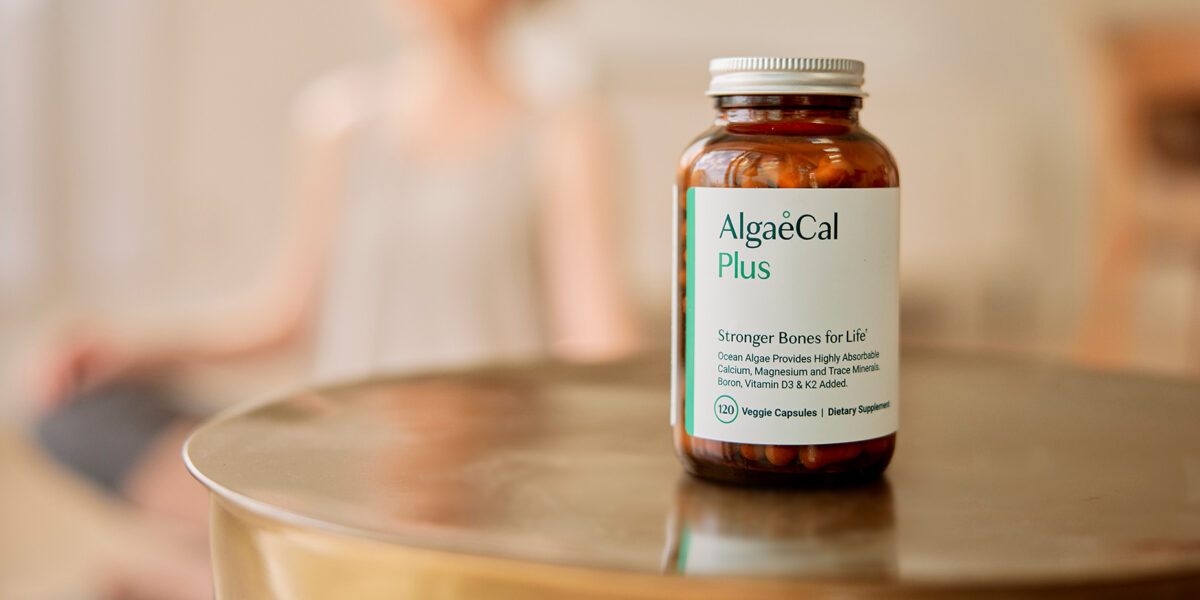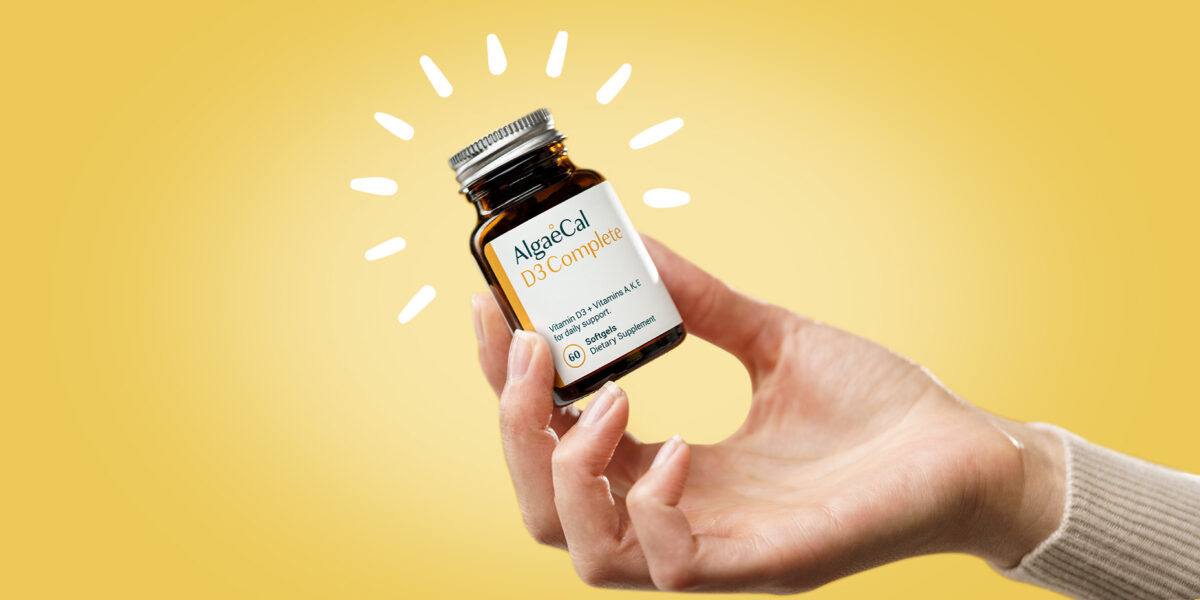Most supplements promise strong bones, but few deliver. Here’s how to spot the difference.
If you’re taking a calcium supplement, you probably think you’re doing the right thing for your bones.
But what if I told you that most calcium supplements on the market do absolutely nothing to build bone?
Or worse… could be putting your health at risk.
Because that’s exactly what’s happening.
Most calcium supplements are made from rocks. These forms of calcium are dirt cheap to produce but hard for your body to absorb. And even if your body does absorb some of it, without the right co-factors—like vitamin K2 and magnesium—that calcium can lead to constipation, kidney stones, and even an increased risk of heart issues.
And let’s talk about vitamin D. Everyone knows it helps your body absorb calcium. But what most people don’t realize is that vitamin D needs a specific set of co-factors to do its job properly.
That’s why so many people still suffer fractures, still get osteoporosis, and still see their bone density drop—even after years of taking vitamin D and calcium supplements.
Supplement companies won’t tell you any of this. They slap a label on a bottle, add a meaningless “supports bone health” claim, and hope you don’t ask questions. But if you care about your bones—if you actually want to increase bone density, not just slow bone loss—you need to know how to choose the right vitamin D and calcium supplement.
That’s exactly what you’re about to learn.
What to Look for in a Calcium Supplement
If you walk into any pharmacy or search online for a calcium supplement, you’ll see hundreds of options. They all claim to “support bone health.” They all contain calcium. But here’s the uncomfortable truth: most of them won’t actually make your bones stronger.
In 2015, researchers from the British Medical Journal conducted the largest-ever analysis on calcium and bone health, reviewing data from over 58,000 participants across 26 randomized controlled trials on calcium supplements. And the findings were crystal clear: calcium supplements don’t prevent fractures.
At best, calcium can slightly slow the rate of bone loss—but it does not increase bone density. Which means if you’re taking calcium supplements hoping to strengthen your bones, you might be in for a rude awakening.
In fact, the wrong supplement won’t just leave your bones vulnerable—it could actively harm your health, leading to kidney stones, digestive issues, and even an increased risk of heart problems.
The difference between a calcium supplement that builds bone and one that just fills a bottle comes down to four key factors. Here’s what to look for.

Is your calcium plant-based?
Most people assume calcium is calcium. As long as you’re taking something, your bones should be covered, right?
Wrong.
The vast majority of calcium supplements come from rocks—chalk, limestone, marble dust. These are dirt-cheap sources, so supplement companies grind them up, stick them in pills, and slap “supports bone health” on the label. But here’s the problem: your body isn’t designed to digest rocks.
Think about it—when was the last time you ate a piece of chalk? Or gnawed on a limestone slab? Never. And yet, that’s exactly what millions of people unknowingly do every single day.
And it gets worse…
A massive 10-year study published in the Journal of the American Heart Association followed 5,448 adults to see how calcium intake affected their heart health. The results? Terrifying.
People who got their calcium from food had a lower risk of hardened arteries. But those who took rock-based calcium supplements—the kind found in most pharmacies? Their risk of coronary artery calcification shot up by 22%.
Let that sink in.
Millions of people take calcium supplements to protect their bones—but according to this study, they might be setting themselves up for heart disease instead.
So what’s the alternative? Plant-based calcium.
Unlike rock-based calcium, plant-based calcium comes from marine algae—a natural, organic source of calcium that your body recognizes and absorbs just like the calcium in food.
And here’s where things get really interesting.
A study published in Molecular and Cellular Biochemistry compared a plant-based calcium to traditional calcium carbonate and calcium citrate. The results? Staggering.
Bone-building activity in human bone cells was four times higher with plant-based calcium. Calcium deposition—the process of actually strengthening bones—shot up. And oxidative stress, which accelerates bone breakdown, dropped.
In other words, plant-based calcium didn’t just sit in the gut. It got into the bones and helped build them.
If you’re serious about strengthening your bones, here’s the bottom line: ditch the rocks and choose a calcium supplement your body actually knows what to do with.
Is Your Calcium Clinically Supported to Increase Bone Density?
99.9% of calcium supplements don’t even claim to increase bone density.
They can’t.
At best, they slap on vague promises like “supports bone health”—a meaningless phrase that tells you nothing. And there’s a reason for that.
They have no proof.
If a calcium supplement hasn’t been tested in real people… if there aren’t human clinical studies showing measurable bone density increases… if those studies haven’t been published in peer-reviewed scientific journals—then how do you know it works?
You don’t.And if there’s no proofit works, why would you waste your time, money—and health—on it?
Does Your Calcium Have The Right Co-Factors?
Taking calcium without its supporting nutrients is like trying to build a house without nails. You don’t just need raw materials—you need the right tools to put them in place.
And when it comes to bone-building, calcium alone isn’t enough.

To actually increase bone density, your body needs a full spectrum of essential co-factors:
- Magnesium – Helps calcium get into bones instead of soft tissues, reducing the risk of calcification in arteries and organs.
- Boron – Supports bone-building hormones like estrogen and testosterone, both crucial for maintaining strong bones.
- Copper – Essential for the formation of collagen, which provides the foundation for strong, flexible bones.
- Manganese – Plays a key role in cartilage and collagen formation, supporting overall bone structure.
- Silicon – Strengthens bones and enhances flexibility, helping to prevent fractures.
- Nickel – Helps regulate calcium metabolism and absorption.
- Selenium – A powerful antioxidant that protects bone cells from oxidative stress, helping maintain their strength.
- Strontium – A natural trace mineral that works alongside calcium to enhance bone formation and reduce bone breakdown.
- Phosphorus – Works with calcium to build strong bones and teeth and plays a key role in bone mineralization.
- Potassium – Neutralizes bone-depleting acids in the body, helping maintain bone strength.
- Vanadium – Supports bone mineralization and helps regulate calcium metabolism.
- Zinc – Vital for bone tissue renewal and helps activate bone-building enzymes.
But minerals aren’t enough. Your body also needs essential vitamins to ensure calcium is absorbed and used correctly:
- Vitamin D3 – Boosts calcium absorption in the gut, ensuring it reaches your bloodstream.
- Vitamin K2 (as MK-7) – Directs calcium into your bones and keeps it out of arteries, reducing the risk of calcification.
- Vitamin C – Supports collagen production, which acts as the scaffolding that holds your bones together.
Without these key co-factors, calcium supplements don’t just fail—they can be ineffective or even harmful.If your calcium supplement doesn’t provide everything your bones need, then what exactly are you paying for?
If Your Calcium Isn’t AlgaeCal, It Can’t Increase Bone Density.
You can take all the calcium supplements you want. You can follow the daily recommended dose. You can spend years choking down those giant chalky pills.
But if your calcium isn’t AlgaeCal, it can’t increase your bone density.
Not won’t. Can’t.
Because AlgaeCal is the ONLY calcium supplement in the world that’s clinically supported to increase bone density.
Here’s What Makes AlgaeCal the Only Real Choice:
First—it’s plant-based.
AlgaeCal is sourced from an organic marine algae—mesophyllum superpositum. This organic algae contains all the minerals needed to increase bone density. And the important part? Because this algae is a whole food, your body is able to digest and absorb its nutrients just like a serving of broccoli or spinach. So you can be sure it’s gentle on your body. The only catch? Not all plant-based calcium is created equal. Only one has peer-reviewed clinical studies proving its effectiveness—and you won’t find it on just any health food store shelf.
Second—it’s clinically supported.
AlgaeCal has been studied by teams of researchers from Harvard Medical School, Georgetown University, and the University of Texas. The findings of this research were published in three peer-reviewed scientific journals––Journal Of Molecular and Cellular Biochemistry, International Journal of Medical Sciences, and the Journal of the American College of Nutrition––these studies all came the same conclusion, AlgaeCal is the ONLY calcium clinically supported to increase bone density.
Third—it’s got all 16 nutrients your bones need.
Your bones aren’t just made of calcium. So why would you take a supplement that only gives you calcium? AlgaeCal provides a full clinical dose of all 16 minerals and vitamins clinically supported to increase bone density.
Fourth – it’s gentle on your body.
AlgaeCal was the subject of a 7 year clinical trial. The results of this trial found that algaecal increased bone density year-on-year for 7 straight years with no adverse side effects reported among the study participants.
Fifth – It comes with a results-based guarantee.
Because AlgaeCal is the ONLY calcium supplement that’s clinically supported to increase bone density––it’s also the ONLY calcium supplement that guarantees you’ll increase bone density.
When you take the Bone Builder Pack as directed you we guarantee you’ll see increased bone mineral density on every DEXA scan you take––starting in as little as 6 months.
And if you don’t? You’ll get a full refund. So you either get stronger bones, or your money back.

Takeaway
If your goal is to actually strengthen your bones—not just “support” bone health, but actually increase bone density—there’s only one option.
AlgaeCal.
Everything else is just expensive chalk.
So now that you know what to look for in a calcium supplement, what about vitamin D?
Let’s break it down.
Doctors Are Rethinking Vitamin D – And You Should Too!
Most people think more vitamin D = stronger bones.
Sounds logical, right?
But a groundbreaking study published in The Journal of The American Medical Association reveals shocking new evidence: taking higher doses of vitamin D—might actually be doing the opposite.
Here’s what the research found:
In a 3-year clinical trial involving 311 healthy adults, participants who took 4,000 IU or 10,000 IU of vitamin D daily experienced a statistically significant decrease in bone density compared to those taking lower doses.
Let that sink in: higher doses of vitamin D—often recommended for “strong bones”—actually weakened them.
This isn’t a fringe study. It’s one of the most credible randomized clinical trials ever conducted on vitamin D. And the implications for your bone health are massive.
So before you pop another pill, ask yourself this: What else don’t you know about vitamin D?
Too Much Vitamin D Could Be Setting You Up for a Fall—Literally.
New research from Johns Hopkins University suggests that older adults taking high doses of vitamin D aren’t just wasting their time—they may be putting themselves in danger.
The study, published in the Annals of Internal Medicine, found that those taking 2,000 or 4,000 IU daily experienced more frequent and severe falls, some even requiring hospitalization.
Dr. Lawrence Appel, the study’s lead researcher, put it bluntly: “A lot of people think if a little bit is helpful, a lot will be better. But for some vitamins, high-dose supplements pose more risks than benefits.”
Think about that. The higher your vitamin D dose, the greater your risk of falling. And those falls? They’re not just statistics—they can mean fractures, long recoveries, and life-changing injuries.
The message is clear: when it comes to vitamin D, more is definitely not better.
What To Look For In A Vitamin D Supplement
You Don’t Need More Vitamin D. You Need Balanced Vitamin D.
Here’s the truth: your body doesn’t need massive doses of vitamin D. What it does need is a safe and balanced blend of all four fat-soluble vitamins: A, D, E, and K. Why? Because when these vitamins work together, their combined benefits are far greater than what any single vitamin can achieve on its own.
Sadly, most supplements skip this critical balance. And it’s not just ineffective—it’s dangerous.
A report in the British Journal of Clinical Pharmacology found that high doses of vitamin D can damage your heart, kidneys, arteries, and even your brain. Another study revealed that lifeguards with high vitamin D levels were 20 times more likely to develop kidney stones than the general population.
That’s why we created D3 Complete. It’s the only supplement that gives you safe and balanced doses of vitamins A, D, E, and K—so you get all the benefits without the risks.
Because true health isn’t about megadoses of any one nutrient—it’s about the right balance of what actually works.

The Only Clinically Supported Solution for Stronger Bones
Most calcium supplements don’t build bone. Most vitamin D supplements aren’t balanced. And if you’re taking the wrong ones, you could be wasting your time—or worse, risking your health.
That’s why AlgaeCal and D3 Complete are different.
- AlgaeCal is the ONLY calcium clinically supported to increase bone density.
- D3 Complete provides the perfect balance of A, D, E, and K to ensure safe, effective absorption.
- Together, they give your bones exactly what they need—without the risks.





Carol Feller
March 6, 2024 , 12:22 pmI can relate to much of this report. Thank you.